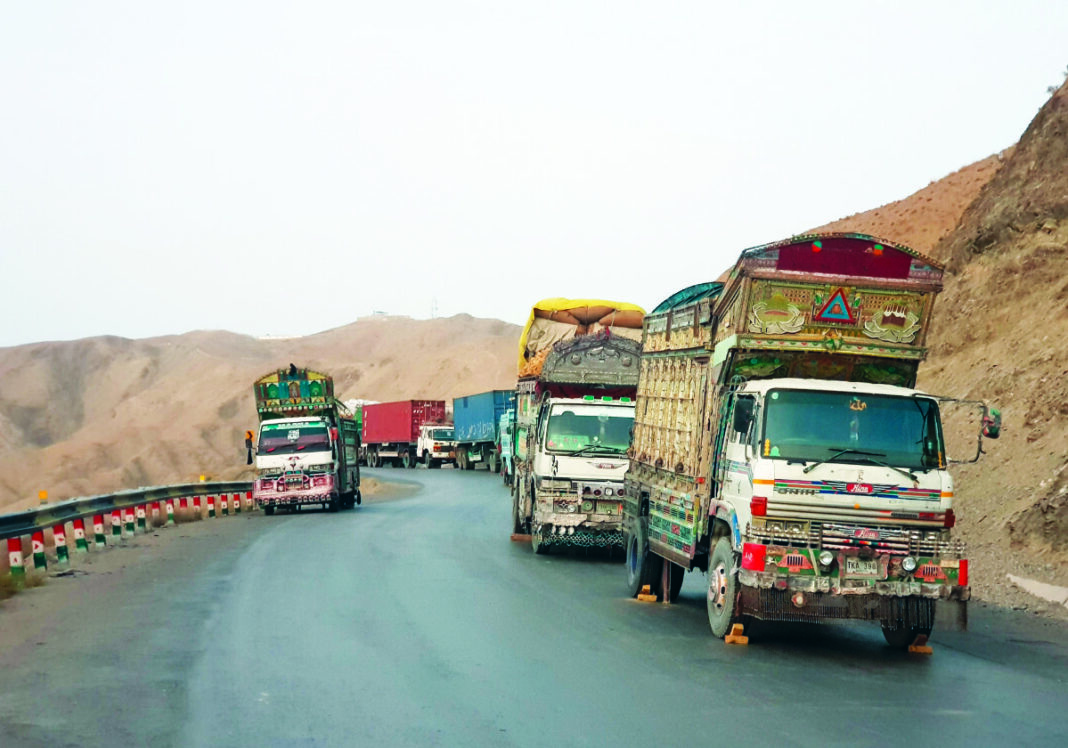KARACHI, Pakistan: The closure of one of Pakistan’s major border crossings with Afghanistan is costing local businesses up to 150 million Pakistani rupees ($854,000) per day in lost trade, commerce chiefs claimed on Wednesday.
Chaman is the second-largest commercial border point between the two countries and links the Balochistan province of Pakistan with Spin Boldak in the Afghan province of Kandahar.
It is one of the most regular trade routes used for the transportation of goods between the two countries.
The crossing, a vital source of customs revenue for the cash-strapped Taliban government in Afghanistan, has been closed for about three weeks, despite repeated protests by truckers and others stuck waiting at the border.
Muhammad Hashim Khan Achakzai, president of the Chaman Chamber of Commerce and Industry, told Arab News: “The border has been closed since the first week of this month which is costing us between 100 million and 150 million rupees per day.
“Every day around 10,000 people travel on both sides of the border from Chaman,” he said, adding that some laborers and traders had been waiting more than 20 days for the border to reopen.
As Afghanistan sinks deeper into economic crisis, neighboring countries have been increasingly worried about a mass movement of refugees. Now, the closure of Chaman and interruptions to traffic at Torkham in Pakistan’s Khyber Pakhtunkhwa province, as well as the suspension of Pakistan Airlines flights from Kabul, have left Afghanistan largely cut off.
Originally closed by Pakistani authorities due to security threats, disputes over issues ranging from the coronavirus disease (COVID-19) to the validity of Afghan travel documents have prevented the reopening of the Chaman crossing, despite severe hardship to truckers and local farmers.
The border was briefly opened on Sunday night and people from both sides were allowed to cross over mainly on medical grounds. However, it was closed again and no movement of goods from either side has been allowed since, according to traders.
Pakistani officials said the issue was on the Afghan side and they expected it to be resolved within the next few days. A spokesperson for the Taliban was unavailable for comment.
Zubair Motiwala, chairman of the Pakistan Afghanistan Joint Chambers of Commerce and Industry, told Arab News: “They (the Taliban) have some visa issues, that is why they have closed the border. They are saying they will open it in a couple of days.”
In the meantime, however, at least 50,000 people in Chaman district who are linked to cross-border trade in a population of around 200,000 continue to suffer.
Jalaat Khan Achakzai, a local trader and former president of the CCCI, told Arab News: “The border closure has driven some 50,000 small and medium traders out of business.”
Traders said trucks carrying dry fruits, vegetables, and other perishable items were parked on both sides of the border.
“Around 2,000 trucks carrying loaded and empty containers are waiting. Traders are also incurring losses as they have to pay around $150 container detention charges to the shipping companies,” Achakzai said.
Jamaluddin Achakzai, also a local trader and former president of the CCCI, said: “Talks between local officials and people from Spin Boldak have taken place but without any outcome. It is vital to open the border which is impacting the livelihoods of more than half-a-million people on both sides. The transporters are selling the fuel, petrol, and diesel of their vehicles to survive.”
Some who have crossed the border said the condition of both Pakistani and Afghan transporters was worsening.
Ehtisham Mufti, a senior Pakistani journalist who recently traveled through the area to Kandahar, told Arab News: “The condition of Pakistani and Afghan truckers on the Afghan side is even more painful as they don’t have enough financial resources to survive. Human tragedy can be avoided if immediate measures are taken in time.”




